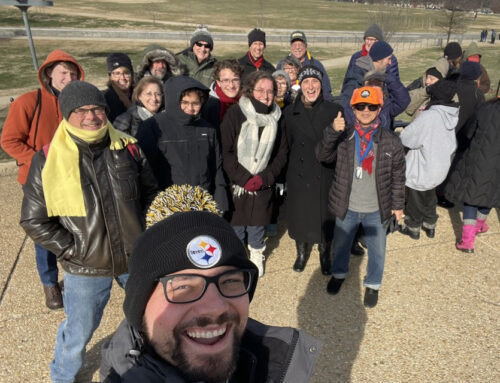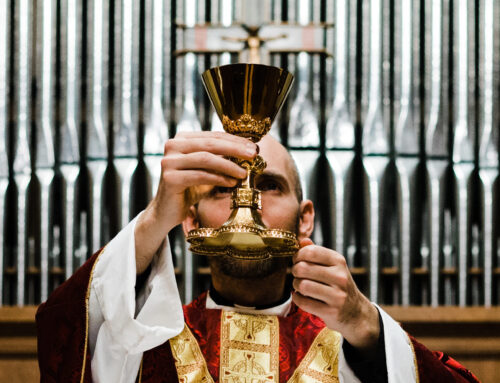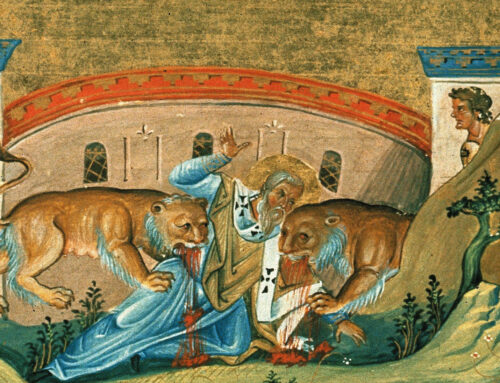In our first reading, we hear Job speaking from the depths of his suffering — a suffering he did not deserve or bring upon himself:
Is not man’s life on earth a drudgery? Are not his days those of hirelings? I am filled with restlessness until the dawn. My days are swifter than a weaver’s shuttle; they come to an end without hope. Remember that my life is like the wind; I shall not see happiness again.
To quote Monsignor Lorenzo Albacete, a theologian and longtime columnist for the New York Times: “Suffering is not a problem to be solved, but a mystery to be lived.”
How do we live this mystery? Well — Albacete suggests that we persistently ask the fundamental question:
“WHY?”
“To ask ‘why’” he explains, “is to be human.”
He goes so far as to say this: ‘I hope my last word as I drop dead is this question: ‘Why?’ Maybe the suffering will be too much and I will stop asking, but if I do, I will not have died as a human being.”
To ask ‘Why’ in the face of great suffering points to the fact that somewhere — somehow — we are convinced that a real answer is still possible. That there is some higher order — some greater purpose — some ultimate aim to all of this. That there is at least some sense left!
This was a turning point in CS Lewis’ conversion. Lewis looked out at the world, broken by World Wars, upheaval and dictatorships — and concluded that because “the universe seemed so cruel and unjust,” then God did not exist. But this argument began to gnaw at him. It made him deeply uncomfortable with his own atheism. Because he realized that if he really believed the suffering of this world was truly, objectively “senseless” and wrong, then he was forced to assume that at least one part of reality—namely his own idea of justice—was “full of sense.”
In other words we only ask “Why” because — thankfully — we refuse to accept the status quo!
We know deep down that something has gone wrong and that there really is an ultimate, satisfying, Good that we are all seeking. We hunger and thirst for righteousness, we want things to be set right in the end.
Peter’s words from our Gospel today come to mind here:
“Everyone is looking for you!”
Everyone is looking for the Answer. Everyone is looking for the Reason for why bad things happen to good people. Everyone is looking for an explanation for disease and terrorism and war and racism and abortion and broken families and sin and death.
In Short: Everyone is looking for Jesus. Perhaps, at first they look for him to alleviate their sufferings, as the great multitude did in the Gospel we heard today. He is, after all, a miracle worker! He attracted the entire town when he began to cure people of their illnesses. But much more than temporary alleviation — they are looking for someone who knows them, understands them, and loves them.
Everyone needs that. Without exception. Everyone is looking to be known, understood, and loved. And in a world so full of suffering, the only place we can find that is in the One who suffered for us. The One who is well-acquainted with sorrows: Jesus Christ, the Suffering Servant of God.
The Answer to our fundamental human question: “Why?” — is not a philosophically airtight argument. It is not a sociopolitical scheme.
The Answer is Jesus.
But he’s an Answer that doesn’t seem very satisfying at first. Because when you get to know the Lord, you find out very quickly that He doesn’t just fix everything for us. Our Gospel today makes that very obvious — After Peter alerts Jesus to the fact that everyone is looking for him (evidently to receive more miraculous healings) — Jesus bluntly says: “Let us go on to the nearby villages that I may preach there also.” This is both humorous and frustrating to me: Instead of sticking around to fix more problems, Jesus effectively says to Peter and the other disciples: “Lets blow this Popsicle stand!”
Why? Because he’s on a mission, not to completely eliminate suffering, but to lead people into the Mystery of God.
Christ doesn’t try to explain our suffering to us, or show us why it makes sense, or why it’s for our own good. Perhaps you’ve seen this first hand? You probably know from personal experience that although God does bring good out of our suffering, very rarely does He make that clear to us when we are in the midst of it.
No — instead, Jesus chooses instead to fully embrace suffering himself. And he gently invites us to join him up on that Cross. He beckons us to believe, from the heart of our trials and tribulations, that God has not abandoned us. That vengeance is the Lord’s — not ours. That we have to await His final justice, His final Word.
This conviction is what motivated and propelled Saint Paul, who in our second reading today said that he became “a slave to all so as to win over as many as possible.”
To the weak, he became weak. To the Jews, he became like the Jews. To the Gentiles, he became like the Gentiles.
In practice, this life of becoming “all things to all” was a life of unimaginable suffering. Paul underwent countless labors, imprisonments, beatings, and brushes with death. He was stoned, shipwrecked, lashed, abandoned, betrayed, ignored, laughed at, and constantly surrounded by danger.
In many ways, Paul is a New Testament version of Job! A man singled out by God to undergo heroic feats of pain and trial. Jesus even says of St. Paul in the book of Acts: “I will show him what he will have to suffer for my name.”
But what’s the difference between Job and St. Paul? I will tell you.
Saint Paul was entirely convinced of the reality of the Resurrection.
He could spend everything he had, all his blood sweat and tears, to preach the Gospel because Christ’s sufferings did not end in Death! They made the Empty Tomb possible.
Our friend Job could only speak in a vague sort of prophecy concerning this future event of the Resurrection when he said: “I know that my Redeemer lives and at last he will stand upon the earth.”
Job perceived in a shadowy way what Paul saw with his own, unveiled eyes — that Jesus did stand back up upon the earth! That’s what the Greek word for “Resurrection” literally means — to “stand up again.” Our Redeemer does not lie down in death — he was not held down by all his many sufferings. By the power of the Holy Spirit, He stood back up. Sin and death could not contain him.
St. Paul became “all things to all,” he preached the Gospel tirelessly because he knew: that ‘Everyone was looking for Jesus!’ That everyone was asking the same exact question: “Why?!?” That’s what makes us human — to look for the Answer. And Paul’s God-given vocation was to offer the only Answer worth having, the Total Answer: which is the grace of God freely given to us in His Son, raised from the dead.
And so Paul cries out: “Woe to me if I do not preach the Gospel!”
I don’t know what suffering you are currently undergoing, but I doubt there are many here among us today who aren’t dealing with something really awful. Something really painful. Something really confusing and frustrating.
Woe to me if I do not preach the Gospel to you in the heart of your suffering — that Jesus is with you. He loves you. And He is raised from the dead for you.
He’s the Answer you’re looking for, and He offers you Himself, Crucified and Risen, in this Holy Eucharist we are about to share.




